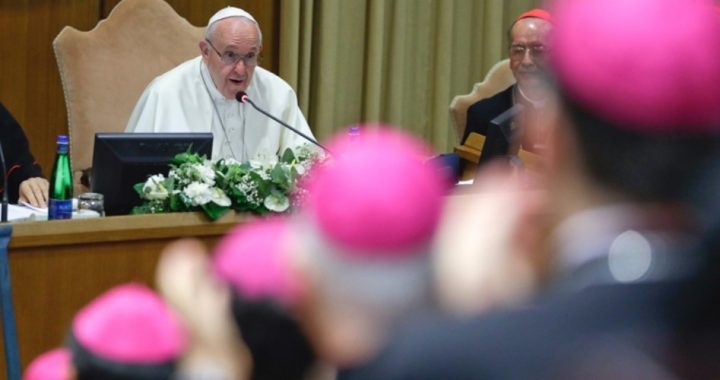
Podcast: Play in new window | Download ()
Subscribe: Android | RSS | More
On the second day of a special Synod for the Pan-American Region, with Pope Francis himself in attendance, the Roman Catholic meeting called for adding “ecological sins” to the catalogue of sins that human beings can commit. Generally speaking, the Synod could have been mistaken for about any other liberal gathering in the United States.
To many on the Left, the fight against “climate change,” which translates into a fight against individual liberty and the modern industrialized world, is a substitute for religion. Now, this Synod of the Roman Catholic Church is making compliance with liberal orthodoxy — that climate change is a result of human industrial activity, and we must surrender both much of our liberty and our standard of living to fight it — the view of Roman Catholicism.
Many Protestant denominations, likewise enthralled with being accepted by the non-believing world, have made similar pronouncements to please modern liberals.
Vatican News reported, “Synod fathers called on the entire international community, which is so often indifferent to the shedding of innocent blood, to take seriously the environmental degradation of the Pan-Amazon region.” The Synod pronounced that it considered the “native populations allies in the fight against climate change.”
How is this to be accomplished? By engaging in “dialogue,” one delegate offered. Of course, this idea of “having a conversation” about this or that topic always means to those on the Left that you take their position as a result of the “conversation.” For example, in addition to the promotion of the dogma that human beings are causing global warming and other various climate changes, the Synod also denounced “individualism.”
The “solutions” offered on the supposed problem of “climate change” included “the need for sustainable development,” which, of course, means increased government control over society. The Synod argued that sustainable development is “socially just and inclusive,” and combines “scientific and traditional knowledge.”
Perhaps most importantly, there were calls for an “ecological conversion, that would allow people to see the gravity of sins against the environment as sins against God, against our neighbor, and against future generations.” As such, there is a need to produce and distribute “theological literature that would include ecological sins alongside traditional sins.” It is not clear how these “ecological sins” could fit into the seven deadly sins of pride, greed, lust, envy, gluttony, wrath, and sloth, but one suspects that the advocates of “ecological conversion” would place these supposed ecological sins in there with greed and gluttony. Perhaps enjoying a steak, or any other kind of meat, will soon be declared “a sin against the environment” by a future Synod.
Fighting climate change was not the only liberal cause promoted at the Synod. The Synod addressed the issue of immigration, calling for “coordinated ecclesial action based on reception/welcoming, protection, promotion, and immigration.”
Predictably, the Synod addressed what it called the “systematic violation of the rights of the original peoples of the Amazon,” as well.
In addition to these specific liberal causes that the Synod argued the Catholic Church should tackle, there were calls to “become an ally to grassroots social movements” in general.
What was not addressed — at least Vatican News did not report it, if it were addressed — was any mention about the importance of taking the gospel of salvation to anyone in the Amazon region. Instead, the working document of the Amazon Synod called for the Church to listen “to the peoples and to the earth.” Exactly how one “listens to the earth” is unclear, but attendees were urged to “convert.”
“The aggression towards this vital zone [the Amazon region] of Mother Earth and its inhabitants threatens their subsistence, their culture and their spirituality,” the document asserted. “It also affects the life of all humanity, particularly the poor, the excluded, the marginalized, the persecuted. The present situation calls urgently for an integral ecological conversion.”
Hijacking the Christian faith to advance a liberal social agenda is, of course, not new — witness the social gospel movement of the late 19th and early 20th centuries, a movement that changed the emphasis of Christianity from converting non-believers to liberal social causes.
This is not to say that Christianity in general, and the Roman Catholic Church in particular, should not be concerned about improving our present world as well as getting prepared to live in eternity. Indeed, Western Civilization grew and flourished to provide the highest standard of living in human history in large part because of Christianity. Thomas Woods, in his book How the Catholic Church Built Western Civilization, powerfully demonstrates this truth.
In the book, Woods shows how the Catholic Church is largely responsible for modern science, free-market economics, the university system, western law, and the sacredness of all human life. According to Woods, no institution has done more to shape Western civilization than the Catholic Church.
Yet, acording to modern leftists, and, unfortunately, far too many in the Catholic Church, the Christianization of the pagan cultures of the Western Hemisphere is somehow something to be ashamed of. Instead of continuing the Great Commission given to the Church by Jesus Christ, liberals in the Catholic Church and other Christian denominations now care more about using the moral authority of Christianity to advance the worship of the Earth instead of the Creator who made the Earth.
Photo of Pope Francis speaking at the opening session of the Synod: AP Images
Steve Byas is a university instructor of history and government. He can be reached at [email protected]



